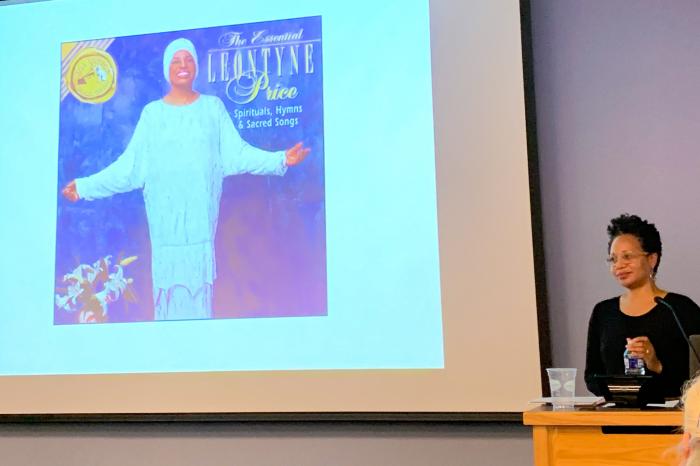Sonya Donaldson on Black Knowledges in Ephemeral Archives

Sonya Donaldson on Black Knowledges in Ephemeral Archives
How do digital platforms facilitate new forms of identity expression? Can the transience of digital content provide occasion to reject the notion of “lost” Black histories? Sonya Donaldson answered these questions and more in a presentation at the Scholars’ Lab entitled, “Ephemeral Archives: Curating Black Knowledges in the Digital Age” in December. Donaldson, Associate Professor of English at New Jersey City University, is currently working on a digital humanities project entitled “Singing the Nation Into Being” which examines videos and metadata to extract information that might provide insights into Black subjectivities, nation, and diaspora. In the fall of 2019, her work was supported by a Virginia Humanities fellowship.
Donaldson focuses on YouTube video performances of “Lift Every Voice and Sing,” originally written in 1899 as a tribute poem to Abraham Lincoln before it became a hymn known widely as the “Black national anthem.” She examined various professional and amateur renditions, mashups, and remixes of the hymn, describing them as expressions of Black identity formation and “sites of memory.” Donaldson opened the talk with an anecdote about her time as a UVA graduate student when Amiri Baraka made an appearance on Grounds. After a performance of “Lift Every Voice and Sing” by student group Black Voices, Baraka said, “There’s more to that song. There’s a lot more.” The cryptic comment prompted Donaldson and her fellow graduate students to ask, “Why don’t we sing it anymore?” She eventually learned that the hymn continued to hold a key position in Black Southern culture well into the 21st century. She added that the question said more about her and her cohort’s relationship to their identity and culture than about the hymn’s endurance in Black communities.
Donaldson cited the role of Toni Morrison’s notion of “rememory” in allowing her to devise a methodology for rebuilding, recovering, and reconstituting Black knowledges. She nodded to the possibilities that platforms like YouTube, Soundcloud, and Vimeo afford, facilitating Black expression, identity formation, and memory building. Searching for a YouTube video performance she had previously viewed, Donaldson encountered a black screen with a notice that the content had been removed due to a copyright infringement. The video’s disappearance brought Donaldson’s research focus on digital ephemera into sharp focus.
Donaldson listed a number of forces that contribute to the transitory nature of digital content including copyright law, privacy-related issues, and shifting business models. Yet, even as technology transforms digital performances into ephemera, Donaldson sees value in the transmutability of Youtube videos and other digital content as they take on new meaning in the form of fragments and mashups.
In an illuminating example, Donaldson played a mashup of an interview with famed American soprano Leontyne Price which segued into a performance of “Lift Every Voice and Sing.” By placing Price’s trenchant commentary on race relations in America alongside her performance, Donaldson said the mashup effectively reconstituted digital fragments to produce a coherent whole that reflected Price’s politics.
She later discussed consent and ethical considerations involved in digital data collection. A number of the Youtube performances of “Lift Every Voice and Sing” featured minors while still others performed their pieces in personal spaces. Donaldson pixelated the faces of minors that appeared in a sampling of her collection during the talk, and she walked the audience through her thought process as she weighed privacy concerns against the aims of her research.
In a tweet, Amanda Visconti, Managing Director of the Scholars’ Lab, described Donaldson’s presentation as a “skillful blending of theory and generous citation + a roadmap of how this scholarly project was inspired through honing in on its current arguments + sharing and analyzing the practical processes of doing this DH scholarship.” Alison Booth, Academic Director of the Scholars’ Lab, echoed Visconti, remarking that the talk was “majestic and humble” and “a great mashup of accessibility and theory.”
